How we did this
Pew Analysis Middle has lengthy studied the altering nature of parenting and household dynamics in addition to the adoption of digital applied sciences. This report focuses on how youngsters interact with digital applied sciences, screens and social media, in addition to mother and father’ attitudes about these behaviors, their considerations about their baby’s use of know-how, and their very own evaluation of their parenting and experiences with digital tech. These findings are primarily based on a survey carried out March 2-15, amongst 3,640 U.S. mother and father who’ve at the least one baby or youngsters ages 17 and underneath. This consists of those that took half as members of Pew Analysis Middle’s American Tendencies Panel (ATP), a web-based survey panel that’s recruited by means of nationwide, random sampling of residential addresses, in addition to respondents from the Ipsos KnowledgePanel. The margin of sampling error for the complete pattern is plus or minus 2.2 share factors.
Recruiting ATP panelists by cellphone or mail ensures that almost all U.S. adults have an opportunity of choice. This offers us confidence that any pattern can symbolize the entire U.S. grownup inhabitants (see our Strategies 101 explainer on random sampling). To additional be certain that every ATP survey displays a balanced cross part of the nation, the information is weighted to match the U.S. grownup inhabitants by gender, race, ethnicity, partisan affiliation, training and different classes.
For extra, see the report’s methodology in regards to the mission. You may as well discover the questions requested, and the solutions the general public supplied on this topline.
Parenting has by no means been straightforward. However the widespread adoption of smartphones and the rise of social media has launched a brand new wrinkle to the challenges of parenthood. The truth is, a majority of fogeys in america (66%) – who embody those that have at the least one baby underneath the age of 18, however who may have an grownup baby or youngsters – say that parenting is tougher right now than it was 20 years in the past, with many on this group citing know-how as a motive why, in line with a Pew Analysis Middle survey carried out in March.
One of the crucial extremely mentioned – and debated – subjects amongst mother and father right now is display screen time. How a lot is an excessive amount of? And what affect will screens have on youngsters’s growth? Amid these rising questions, the World Well being Group issued tips final 12 months on the period of time younger youngsters ought to spend in entrance of screens.
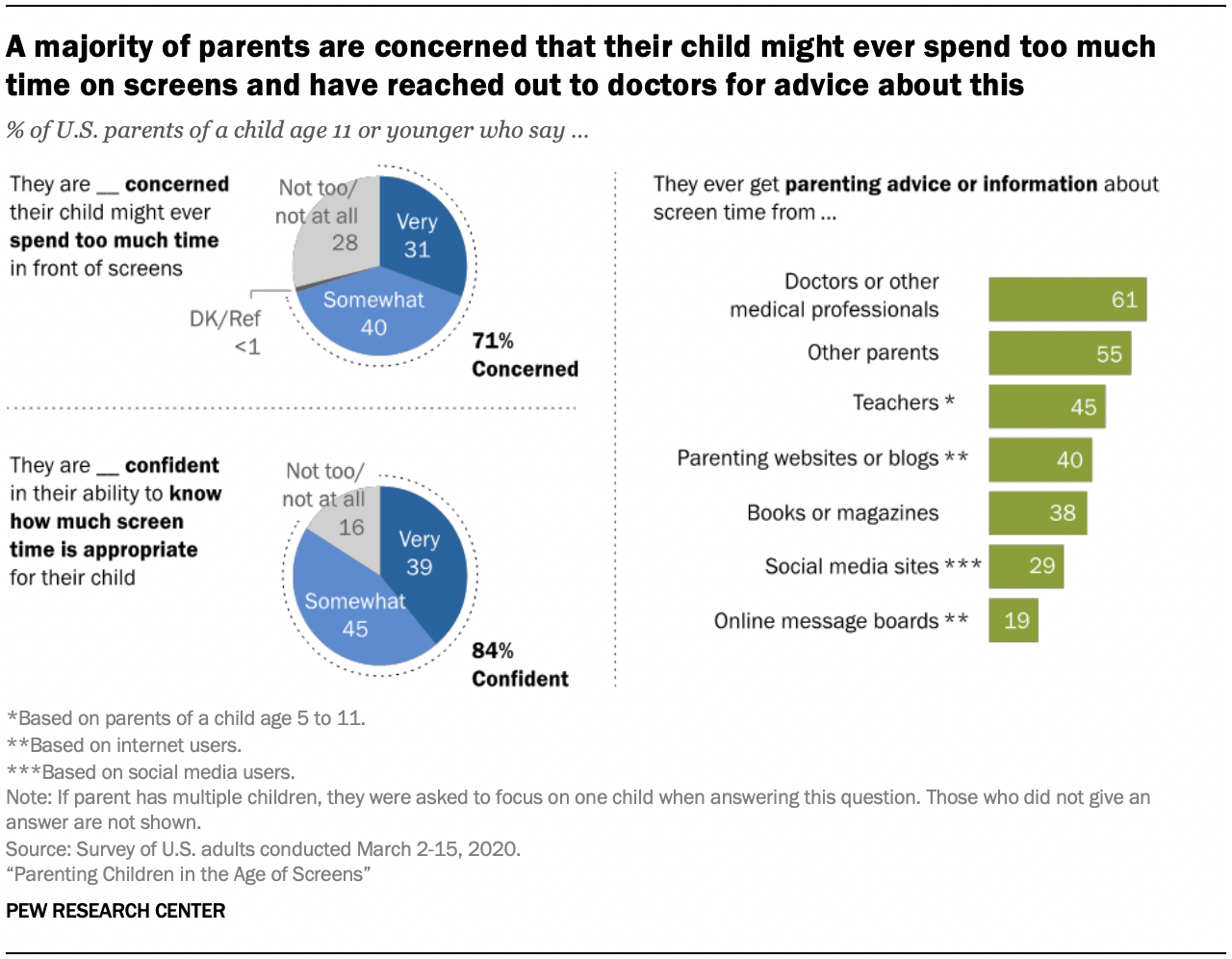
Dad and mom with younger youngsters themselves clarify they’re anxious in regards to the results of display screen time. Totally 71% of fogeys of a kid underneath the age of 12 say they’re at the least considerably involved their baby would possibly ever spend an excessive amount of time in entrance of screens, together with 31% who’re very involved about this. And a few mother and father with a toddler on this age vary already consider their baby spends an excessive amount of time on sure gadgets, together with a smartphone. (You will need to notice that this survey was fielded earlier than the COVID-19 outbreak within the U.S. that closed many faculties and led to widespread shutdowns and stay-at-home orders all through the nation.)
Whereas a majority of fogeys with a younger baby say they’re very (39%) or considerably assured (45%) in understanding the suitable quantity of display screen time for his or her baby, they’re additionally searching for out recommendation from others. Some 61% of fogeys of a kid age 11 or youthful say they’ve obtained recommendation or details about display screen time from a physician or different medical skilled and 55% say the identical about different mother and father, whereas 45% of fogeys of a kid age 5 to 11 have turned to academics for assist.
Dad and mom total are additionally apprehensive in regards to the long-term results of smartphones on youngsters’s growth: 71% consider the widespread use of smartphones by younger youngsters would possibly probably end in extra hurt than advantages.
These worries come at a time when it’s pretty frequent for youngsters of all ages to interact – in a roundabout way – with digital gadgets. For instance, 80% of fogeys say their baby age 5 to 11 ever makes use of or interacts with a pill pc, whereas 63% say the identical about smartphones. For fogeys of kids underneath the age of 5 these shares are additionally notable: 48% and 55%, respectively. On the similar time, roughly one-third of fogeys of a kid 11 or youthful (36%) say their baby ever makes use of or interacts with a voice-activated assistant, like Apple’s Siri or Amazon Alexa. However there are huge age gaps: mother and father who’ve an older baby, between the ages of 5 and 11 (46%), are extra doubtless than mother and father with a toddler age 3 to 4 (30%) or 2 or youthful (14%) to say their baby makes use of or interacts with this sort of know-how.
Terminology
A number of phrases used on this report are associated to folks, age of kids and the know-how adoption practices of kids. This reference information explains every time period.
Guardian is used to seek advice from an grownup who stories being a dad or mum or guardian of at the least one baby underneath the age of 18, however who may have an grownup baby or youngsters.
Dad and mom of a kid age 11 or youthful is used to refer to folks who report having a toddler age 11 or youthful. In circumstances the place households have a couple of baby on this age vary, these questions requested the mother and father give attention to a type of youngsters, both their oldest or youngest baby on this age vary (primarily based on random task).
Dad and mom of a kid age 4 or youthful is used to refer to folks whose randomly assigned baby is underneath the age of 5 (0 to 4).
Dad and mom of a kid age 5 to 11 is used to refer to folks whose randomly assigned baby is between the ages of 5 and 11.
Younger baby is used to explain youngsters underneath the age of 12.
Engagement and interplay with digital know-how amongst youngsters was measured by asking mother and father in regards to the gadgets their baby “makes use of or interacts with.”
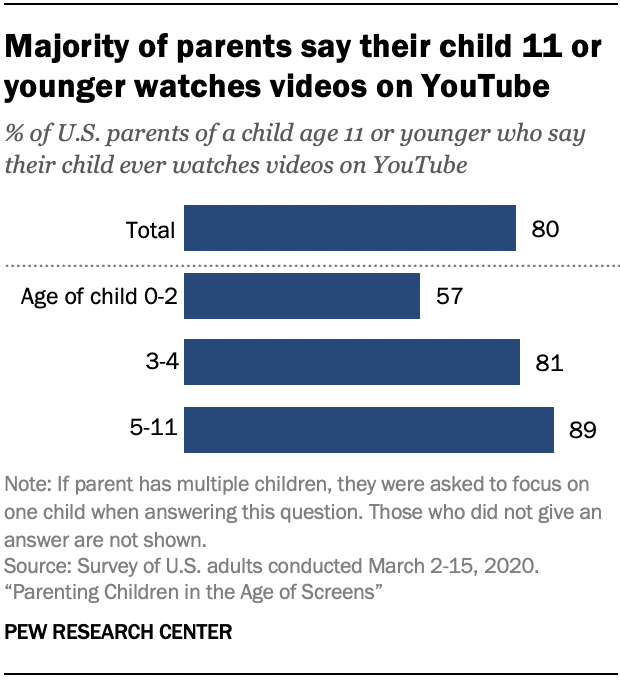
YouTube has emerged as a key platform for each youthful and older children. Totally 89% of fogeys of a kid age 5 to 11 say their baby watches movies on YouTube, as do 81% of those that have a toddler age 3 to 4 and 57% of those that have baby age 2 or youthful. And whereas majorities of fogeys whose baby makes use of YouTube credit score the platform for entertaining and educating their youngsters, a majority of those mother and father are involved about their baby being uncovered to inappropriate content material on the video sharing website.
However the dialog round display screen time isn’t restricted to youngsters. Dad and mom themselves grapple with their very own gadget distractions. When requested in the event that they spend an excessive amount of, too little or not sufficient time on their cellphone, greater than half of fogeys total (56%) say they spend an excessive amount of time on their smartphone, whereas about seven-in-ten (68%) say they’re at the least generally distracted by their cellphone when spending time with their youngsters.
These findings come from a nationally consultant survey of three,640 U.S. mother and father who’ve at the least one baby underneath the age of 18, however who may have grownup youngsters, carried out on-line March 2-15, 2020, utilizing Pew Analysis Middle’s American Tendencies Panel and the Ipsos KnowledgePanel. The next are among the many different main findings.
Many mother and father cite know-how as a motive why parenting is tougher right now than previously
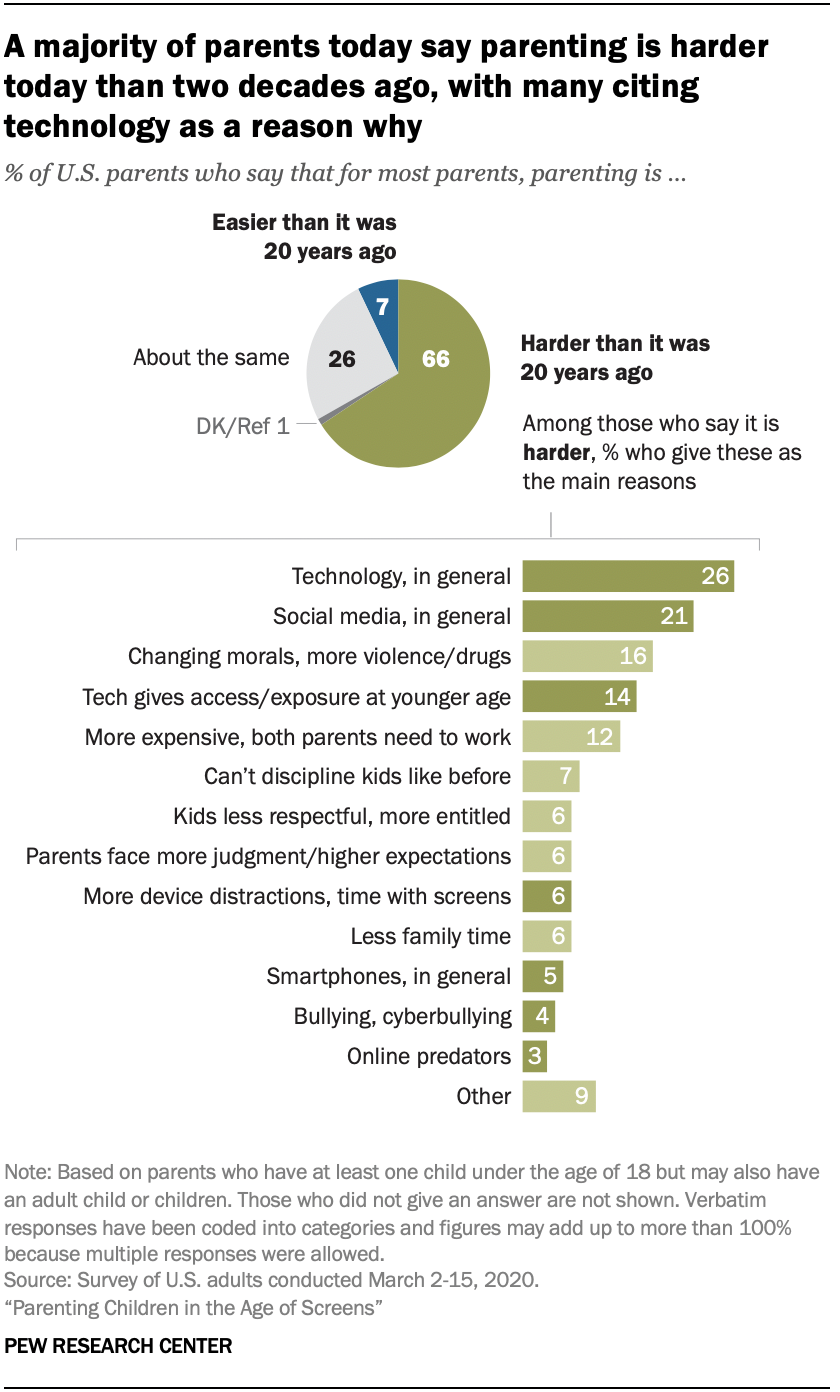
When requested whether or not parenting is tougher, simpler or about the identical because it was 20 years in the past, bigger shares of fogeys (66%) – which incorporates those that have at the least one baby underneath the age of 18 – say they consider it’s tougher right now for many mother and father. In the meantime, simply 7% suppose it’s simpler, whereas 26% consider parenting is about the identical because it was 20 years in the past.
Throughout demographic teams, mother and father usually tend to say that parenting right now is harder fairly than simpler compared with the previous, however there are some modest variations by age. About seven-in-ten mother and father ages 50 and older (71%) say parenting is tougher right now, versus 66% of 30- to 49-year-old mother and father and 60% of these ages 18 to 29.
Dad and mom cite a lot of completely different the reason why they suppose parenting has grown harder through the years. A number of the most typical responses are likely to stress the affect of digital know-how (26%), the rise of social media (21%) and the way entry to know-how exposes youngsters to issues at a younger age (14%). Different generally cited causes for parenting rising harder embody altering morals and values and the prices related to elevating a toddler.
Dad and mom are cautious of the affect of cellular gadgets, and comparatively few suppose youngsters underneath 12 ought to have their very own smartphone
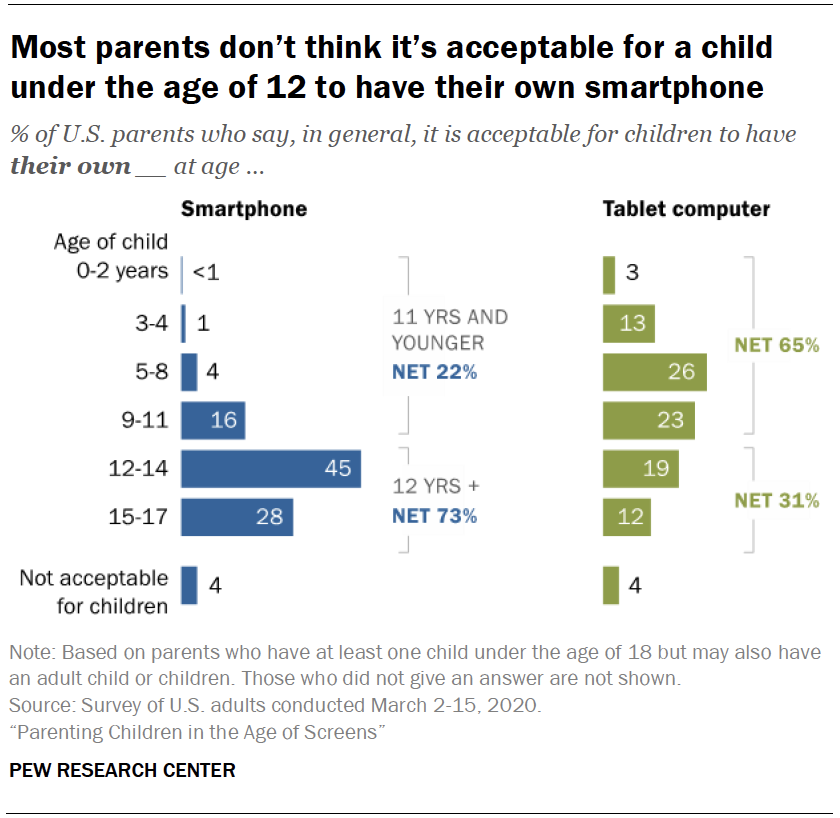
With many youngsters gaining access to cellular gadgets, one of many questions posed to folks and consultants alike is when it’s acceptable for youngsters to have their very own smartphone or pill pc.
The ages of 12 to 14 appear to be a serious milestone in mother and father’ eyes for smartphones. This survey finds {that a} majority of fogeys (73%) consider it’s acceptable for youngsters to have their very own cellphone solely after they’ve reached at the least the age of 12. Some 45% say smartphone possession is appropriate between the ages of 12 and 14, and 28% say it’s acceptable between the ages of 15 and 17. Simply 22% suppose it’s OK for a kid underneath the age of 12 to have one.
When requested in regards to the acceptable age for a kid to have their very own pill, mother and father are extra accepting of kids having one at a youthful age. Totally 65% of fogeys say it’s acceptable for baby to have their very own pill pc earlier than the age of 12.
Dad and mom who’ve at the least one minor baby however who may have grownup youngsters weighed in on whether or not they thought using smartphones by younger youngsters would assist or damage their skill to do a wide range of issues reminiscent of develop wholesome friendships or do properly at school. Dad and mom are involved in regards to the affect that smartphones may have on youngsters’s interpersonal expertise. Totally 71% of fogeys say using smartphones by youngsters age 11 or youthful will damage their skill to be taught efficient social expertise lots or somewhat, whereas an identical share says the identical about growing wholesome friendships. Simply over half of fogeys suppose these gadgets will damage youngsters’s skill to do properly at school, whereas mother and father are extra evenly cut up in terms of how smartphones will affect youngsters’s skill to be artistic or pursue their hobbies and pursuits.
YouTube is extensively utilized by youngsters, with mother and father seeing each advantages and disadvantages to the platform
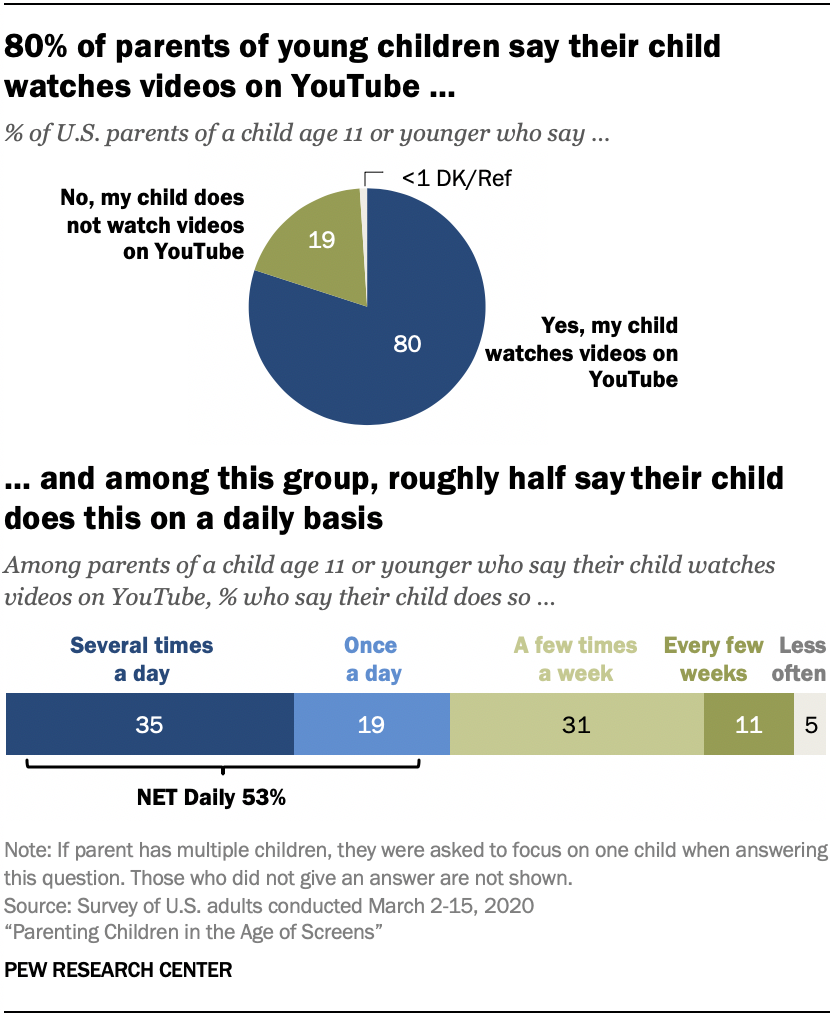
Except for interactions with the gadgets themselves, youngsters additionally interact with a variety of platforms and web sites, and YouTube has emerged as a key platform for youths.
A transparent majority of fogeys who’ve a toddler age 11 or youthful say this baby ever watches movies on YouTube. Amongst mother and father who say their baby watches movies this manner, 53% say their baby does this every day, together with 35% who say their baby watches these movies on the platform a number of instances a day.
However these numbers fluctuate considerably by race and ethnicity. Black (50%) or Hispanic mother and father (40%) who’ve a toddler on this age vary who watches YouTube usually tend to say their baby does this a number of instances a day, in contrast with white mother and father (29%).
In the case of their opinions in regards to the video-sharing website, mother and father provide each optimistic and destructive critiques of the platform. Totally 97% of fogeys whose baby watches movies on YouTube say it retains their baby entertained, 88% consider it helps them be taught new issues, whereas 75% say the platform exposes their baby to completely different cultures. Nonetheless, majorities of fogeys are involved in regards to the kinds of movies their baby might encounter on YouTube, and a few report that their baby has come throughout unsuitable materials. Some 46% say their baby age 11 and youthful who watches YouTube movies has encountered movies that had been inappropriate for his or her age.
Overwhelming majority of fogeys say they restrict when and the way lengthy their baby can use screens, whereas digital ‘grounding’ is a comparatively frequent observe for fogeys
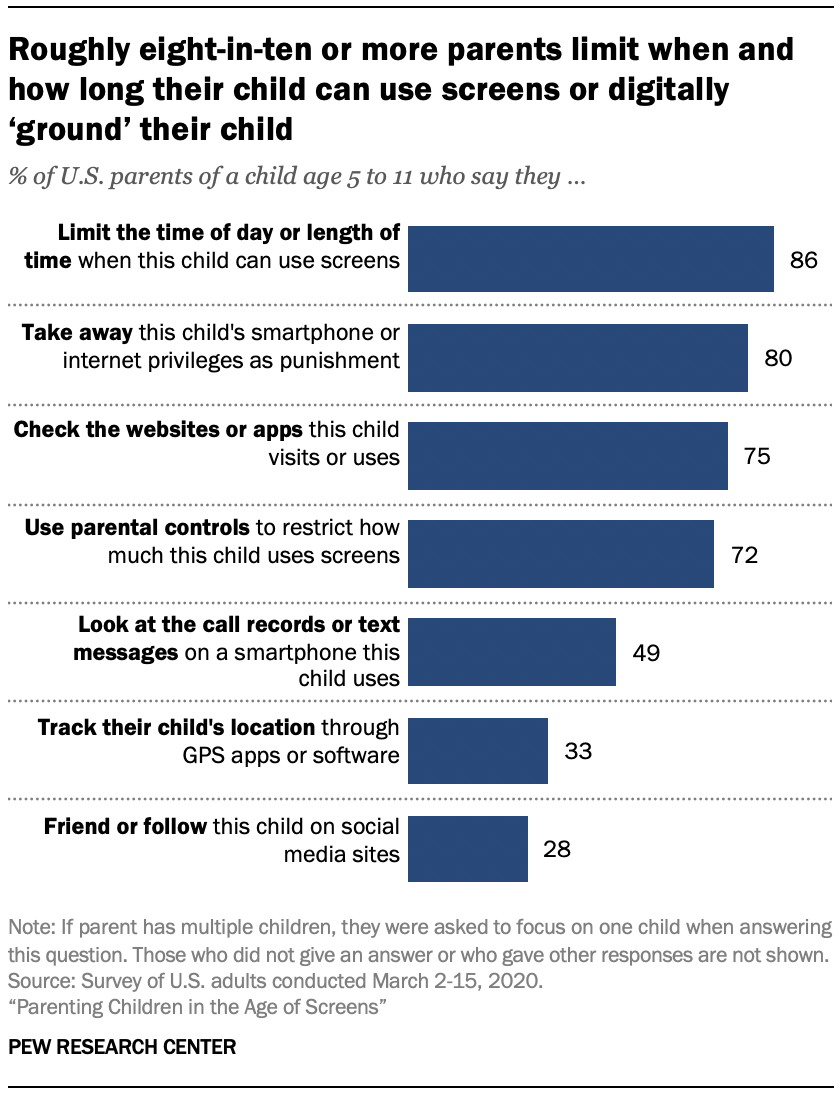
Along with mother and father’ considerations about display screen time, there are different tech-related worries which might be on their minds. Majorities of fogeys say they’re at the least considerably involved about their baby ever being the goal of on-line predators, accessing sexually specific content material, accessing violent content material on-line or ever being bullied or harassed on-line.
Amid these worries, mother and father report that they monitor their younger baby’s digital actions in a lot of methods, with most limiting display screen time and utilizing digital “grounding” as a disciplinary tactic.
Totally 86% of fogeys of a kid age 5 to 11 say they restrict the time of day or size of time their baby can use screens, whereas eight-in-ten say they take away their baby’s smartphone or web privileges as punishment. About three-quarters of fogeys of a kid age 5 to 11 say they verify the web sites this baby visits or the cellular apps they use (75%) and use parental controls to limit how a lot this baby makes use of screens (72%).
Roughly half of fogeys of a kid on this age vary (49%) say they have a look at the decision data or textual content messages on a smartphone utilized by this baby. Different types of monitoring like monitoring the situation of their baby by means of GPS apps or software program (33%) or friending or following their baby on social media (28%) are far much less frequent.
On the similar time, greater than half of fogeys of a kid 11 or youthful say they’re at the least considerably involved about their baby ever being the goal of on-line predators (63%), accessing sexually specific content material (60%) and accessing violent content material on-line (59%). Considerably comparable shares (56%) report they’re very or considerably involved that their baby would possibly ever be bullied or harassed on-line.
Dad and mom have their very own struggles and experiences with smartphones and social media
Along with monitoring their youngsters’s display screen time and use of digital gadgets, mother and father additionally acknowledge how their very own telephones have led to distracted parenting.
Greater than half (56%) of fogeys who report having at the least one minor baby, however who may have an grownup baby or youngsters, say they spend an excessive amount of time on their smartphone, whereas smaller shares say they spend an excessive amount of time on social media (36%) or enjoying video video games (11%).
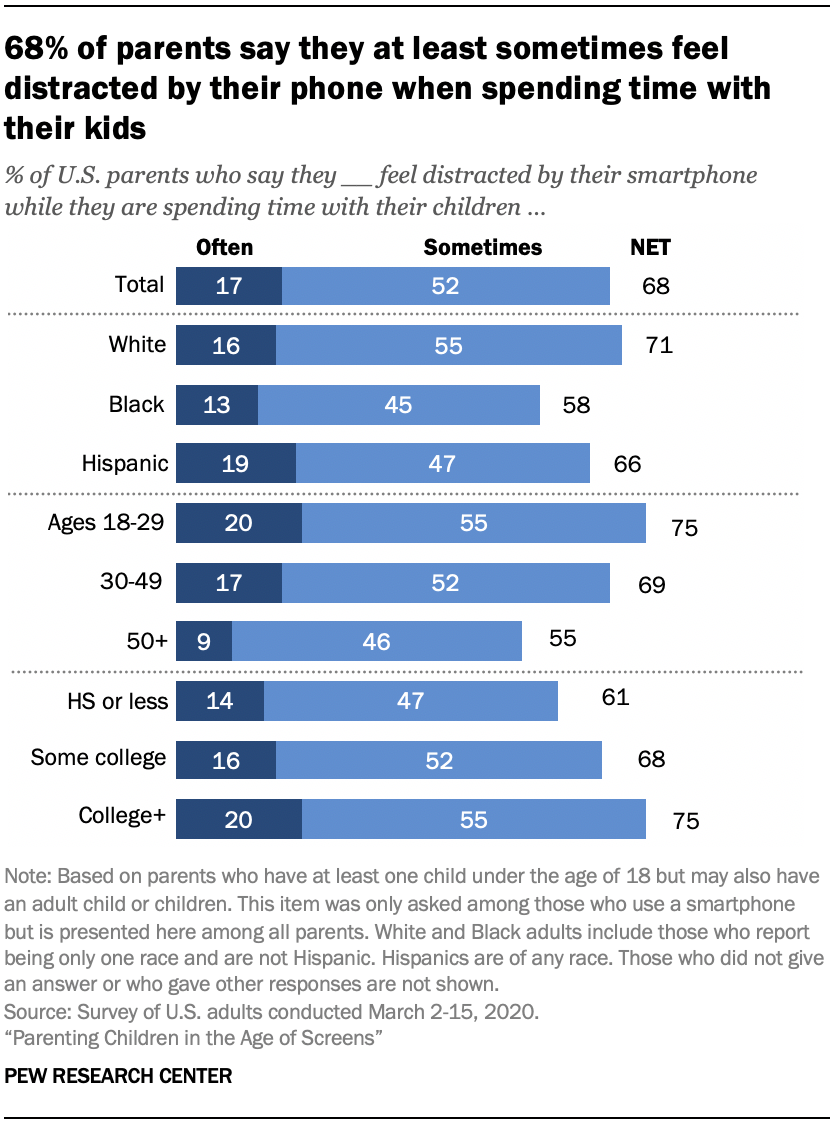
A majority of fogeys additionally report that their cellphone can get in the way in which of spending high quality time with their youngsters. Roughly seven-in-ten mother and father (68%) say they’re at the least generally distracted by their smartphone, with 17% saying this occurs typically.
Dad and mom’ assessments of their know-how use fluctuate by age. For instance, mother and father ages 18 to 49 are extra doubtless than these ages 50 and older to say they spend an excessive amount of time on their smartphone (59% vs. 36%). Equally, mother and father underneath the age of fifty are extra doubtless than these ages 50 and older to say they typically or generally really feel distracted by their smartphone when spending time with their youngsters (70% vs. 55%).
There are additionally variations by instructional attainment: Dad and mom with a university diploma or increased (59%) or these with some school expertise (60%) are extra doubtless than these with a highschool training or much less (47%) to say they spend an excessive amount of time on their smartphones. In the case of feeling distracted by their cellular gadget, 75% of fogeys with a university diploma say they’re least generally distracted by their cellphone when they’re spending time with their children, in contrast with 68% who’ve some school experiences and 61% of those that have a highschool training or much less.






























































